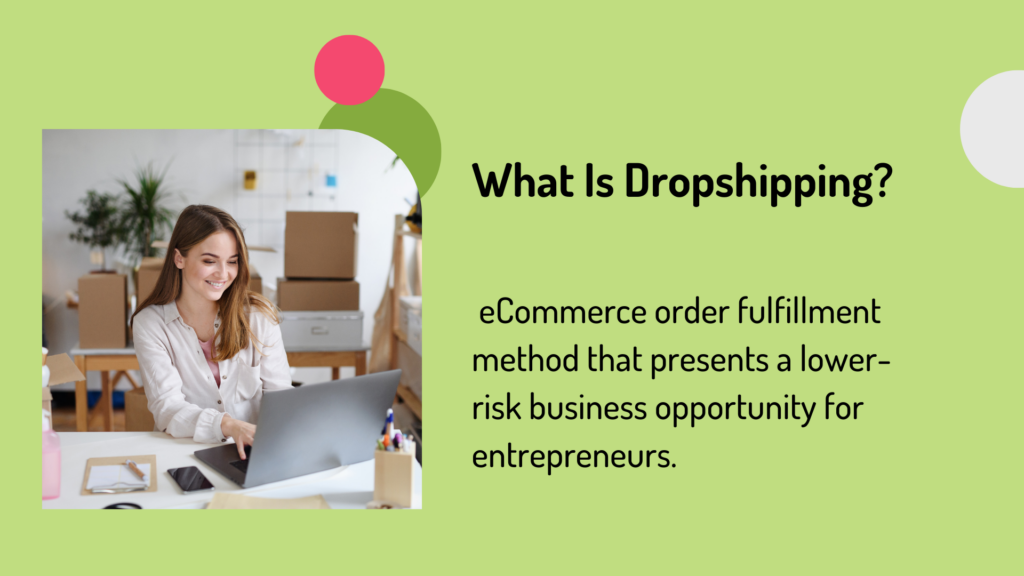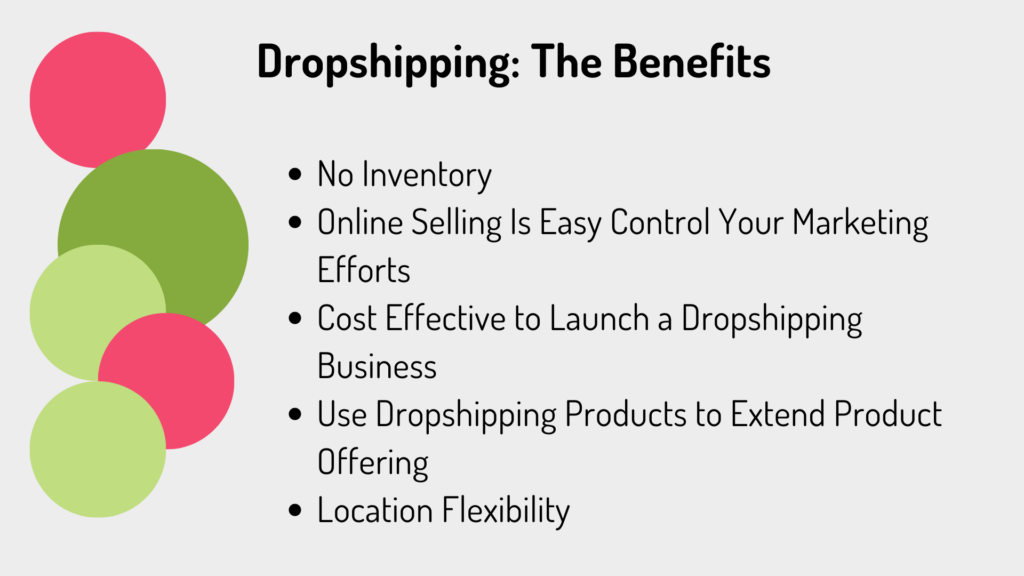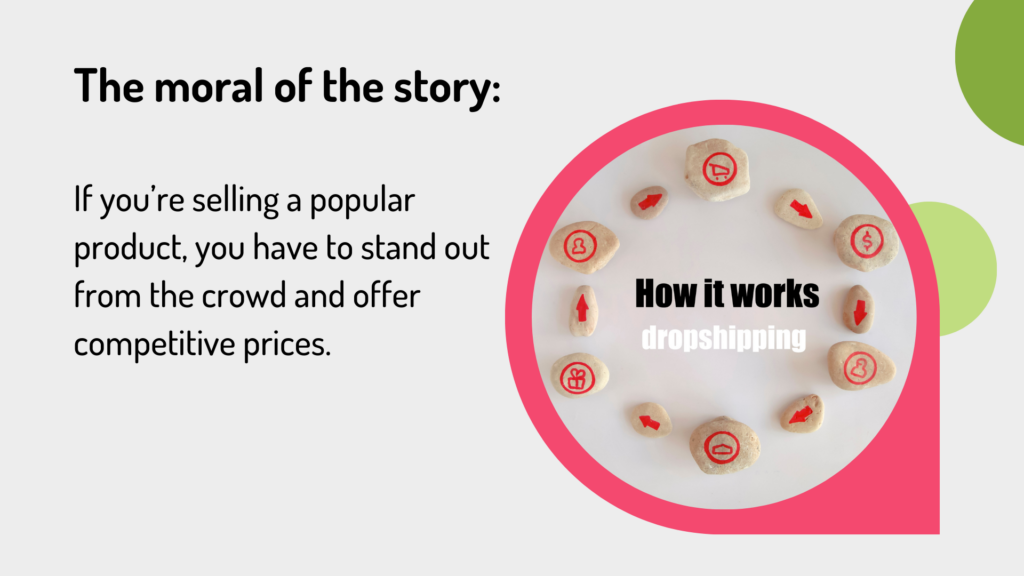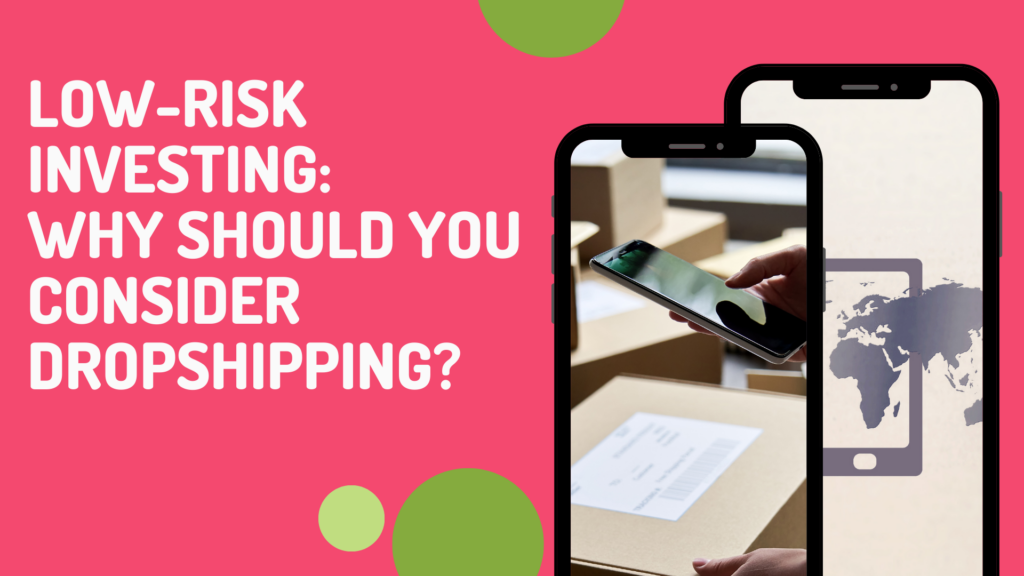Dropshipping is a lower-risk eCommerce venture. As such, it’s become an exceedingly popular order fulfillment model among budding entrepreneurs.
To give you an idea of just how prevalent dropshipping is, Fundera estimates that around 23% of online sales are executed this way, and the worldwide dropshipping market is expected to grow by 28.8% by 2025.
With that said, we’re going to dig deeper into the following:
- What is dropshipping?
- The benefits of dropshipping
- The challenges of dropshipping
That’s a lot to get through, so let’s start!

I. What Is Dropshipping?
Before we go any further, let’s ensure we’re all on the same page about what dropshipping actually is:
In short, dropshipping is an eCommerce order fulfillment method that presents a lower-risk business opportunity for entrepreneurs seeking to make money online. Often, dropshipping businesses start as a side hustle and, if successful, can become a full-time job.
Here’s how it works:
First, you need to source inventory from a reliable supplier.
Pro Tip: Consider working with a reliable online platform that vets its suppliers. This increases the likelihood of obtaining high-quality products from reputable vendors. Ideally, such a platform should partner with suppliers selling products across various niches (but more on that below!).
You then sell your chosen products on your own online store. Then, when a customer makes a purchase, the order is forwarded from your eCommerce store to your chosen supplier(s).
Your supplier then takes care of order processing on your behalf, which includes:
- Picking the product
- Packing the product
- Shipping the product directly to your customer
It’s that simple.
As such, dropshipping empowers you to sell products online without having to:
- Manufacture your own products
- Make an initial investment in inventory
- Store Merchandise
- Be responsible for order fulfillment, packing, and shipping
Simple, right?
Even though the logistics of running a dropshipping store are more straightforward and the costs involved are initially much cheaper than launching a traditional retail business, that isn’t to say that running a dropshipping store doesn’t require hard graft.
For instance, you’ll still have to:
- Find attractive products to sell
- Market your products effectively
- Run the day-to-day aspects of your business, including customer service
- Manage a good relationship with your suppliers
- Set a profitable pricing strategy
This last point can’t be stressed enough. To ensure you price products correctly, consider all your associated costs. These include shipping, the product’s base price, taxes, how much you pay for your domain, your eCommerce platform, etc. This is essential to ensure you turn a profit.
Now, with the basics covered, let’s take a peek at the main pros and cons of dropshipping:

II. Dropshipping: The Benefits
As we’ve already hinted at, there are several advantages to this low-risk business model.
Below, we’ll explore the benefits of dropshipping in more detail:
-
No Inventory
One of the biggest perks is that you don’t have to budget for purchasing inventory up-front because you only part with your hard-earned cash once a customer makes a purchase. You never have to come into contact with the products you’re selling!* Needless to say, the founding stages of any enterprise are often the tightest, so this goes a long way to relieve some of the financial burden associated with launching a new business.
The same goes for storing your products. Instead, your supplier does that for you. So, again, you don’t have the hassle of trying to warehouse merchandise in your home, nor the worry or expense of sourcing third-party warehousing space.
*Although, in theory, you could never come into contact with the products you’re selling, we recommend ordering a sample before advertising the product for quality control.
-
Online Selling Has Never Been Easier
As previously hinted, you’ll need your own online store to hit the ground running with dropshipping. Fortunately, selling online has never been easier because there are tons of eCommerce platforms on the market that make designing and managing your online shop a breeze. Some examples include Shopify, BigCommerce, and Wix – to name but a few!
-
You Control Your Marketing Efforts
While you may not wholly control your order fulfillment, you command your marketing efforts. You decide how you reach customers. Fortunately, marketing doesn’t have to cost a fortune. For example, provided you’re not running paid ads, getting the word out about your products across social media platforms, including Facebook Marketplace, Pinterest, Instagram, YouTube, and so on, is free.
There are also plenty of free online resources to refer to when building your marketing plan. For instance, if you’re looking for a handbook that walks you through marketing your online store, Spocket’s guide is worth a read. This includes tips on building a high-converting store, effective SEO, and more.
-
You Don’t Need a Small Fortune to Launch a Dropshipping Business
Dropshipping, compared to other business models, doesn’t require much in the way of upfront funds. Instead, you can dip your toe in the water without spending tons of money from the get-go of your business venture. After all, there’s no staff to hire, no premises to rent, and no visits to the bank for a business loan to buy inventory.
On that same note, unlike traditional retailers that work with wholesalers or manufacture their own products, there’s no budgetary limit to how many products you can offer. As dropshipping businesses don’t have to buy their inventory ahead of time, they can, in theory, offer hundreds of products without the usual financial burdens of purchasing and storing products.
The main cost will be your chosen eCommerce platform. That said, some services offer free packages and trials you can take advantage of. For example, BigCommerce offers a 14-day trial, and Shopify offers a free three-day trial followed by $1/mo for the first two months once you sign up for the pricing plan of your choice. Elsewhere, there’s Square Online, which offers a free program (aside from transaction fees). Depending on your needs, a freemium plan like this might be enough to get the ball rolling until you’re ready to financially invest in your business.
Other costs might include subscribing to a dropshipping product-sourcing platform. Again, utilizing one that offers a free trial before committing is advisable. Lastly, as mentioned above, we suggest ordering product samples before you list the item on your online store. Of course, this will often incur a cost.
However, other than the above, provided you already have a laptop or desktop and a stable internet connection, you shouldn’t have to factor much else (if anything) into your budget.
-
You Can Use Dropshipping Products to Extend Your Current Product Offering
If you already have an eCommerce store selling non-dropship products and want to extend your product offering, one of the easiest ways to achieve this is to utilize dropshipping. This could particularly benefit you if, for example, you want to sell large items that complement your brand and you don’t have the space or budget to warehouse these products.
-
Grow at Your Own Pace
The beauty of running a dropshipping business is that you can grow at your own pace. You can grow fast; you can grow slow. It’s up to you. This type of business has no reliance on a physical location because you’re not renting a warehouse or hiring staff. Instead, your order is warehoused, fulfilled, and shipped by a third party – which means you don’t have the pressure to generate the profits necessary to cover such expensive outgoings.
-
Location Flexibility
As we’ve already hinted, there’s no pressure to be based in a specific location. Instead, you can run your dropshipping business from anywhere in the world from the convenience of your laptop.
Or, if your tech stack comes with mobile-friendly apps, you can manage your business from your phone! For example, Spocket has an app you can download for free to source products while on the go. Similarly, eCommerce platforms like Shopify and WooCommerce also come with apps enabling you to manage your store while on the run.

III. Dropshipping: The Challenges
To provide a balanced opinion, let’s examine some of the more challenging or risky aspects of dropshipping:
-
Reliance on Third Parties
Although it’s exciting to imagine running a business where you don’t have to think about inventory, storage, upfront costs, order fulfillment, or shipping. However, when you depend upon a third party to do all the above for you, what happens if they let you down?
The result: It’s still your brand that suffers. That’s why it’s super important you find a reputable, responsive, and reliable supplier who can head off any potential pain points.
Needless to say, if something goes wrong with an order, it’s your job to sort that out. But when you don’t control your inventory because a third party does it for you, there’s an added layer to get through. For example, imagine a customer’s order hasn’t arrived, or it’s arrived, and it’s faulty. You’ll need to communicate with your third-party supplier to address the above issues. Failure to do so can result in a poor review.
It’s also possible that your third-party supplier might go bust. That’s why it’s paramount to thoroughly check suppliers before using them. Otherwise, you face finding a new supplier while fending off unhappy customers.
This is where using a dropshipping supplier platform that rigorously vets its vendors comes in handy. Again, let’s take Spocket as an example; each supplier that applies to Spocket is reviewed in-depth to ensure it meets the requirements, such as high-quality products, fast order processing, discounts on retail prices, etc.
-
Profits Are Tight, So You Have to Focus on the Long Game
Fundera estimates that only 10% of dropshippers make a profit in their first year. In other words, dropshipping isn’t a get-rich-quick option.
This is where profit calculators provided by dropshipping supplier platforms and eCommerce builders come in handy. For example, Spocket and Shopify both offer easy-to-use profit calculators that you can use to help you construct a fruitful pricing strategy.
When setting your pricing strategy, you’ll have to factor in the cost of your product’s base price and shipping costs, both of which are set by your third-party supplier. On top of that, you’ll have to factor in the cost of your eCommerce platform subscription, marketing costs, supplier platform subscription, etc. Covering these expenses may reduce your profit margins.
According to Printofy, the average profit on dropshipping products is between 15% and 20%. So, if you want to turn a good profit, look for higher-quality products that command higher earnings. Ideally, your chosen platform will have product filters on its website to make it easier to identify premium items.
-
Competition Is Fierce
You can’t assume that no one else is selling the same products as you. For example, on your supplier platform, AliExpress, 10,000 units of the Luxury Shockproof Transparent Case for iPhone have been sold, and we’re pretty sure that isn’t just from one merchant!

The moral of the story: If you’re selling a popular product, you have to stand out from the crowd and offer competitive prices.
Since competition is so fierce, some platforms offer exclusive product access, typically to those signed up for higher-paid plans. For example, Spocket customers signed up for their Pro, and Empire plans receive such access.
Other ways to compete include:
- Earning a reputation for good customer service, which includes replying quickly to customer questions.
- Having a fast and responsive eCommerce store that customers find easy to use.
- Fast shipping – one study cited by weare2go found that 33% of customers expect fast shipping, and 42% want two-day shipping for online purchases.
Of course, these are just a few of the many things you can do to stand out from the crowd, but hopefully, you get the gist of what we’re talking about.
IV. Our Final Thoughts
Hopefully, having read this blog post, you now know why dropshipping is a relatively low-risk investment worth considering.
Not least because:
- You don’t hemorrhage money purchasing inventory upfront
- You can run this type of online business on the go
- You don’t have to manage the logistical side of order fulfillment
Before we bid you goodbye, remember that a lot depends on sourcing high-quality products to run a successful dropshipping business. So, whatever your niche is, you must do the research first. If you’re unsure where to begin, a reputable dropshipping supplier platform that highly scrutinizes its products is an excellent port of call.
That’s all from us! Do you reckon you’ll launch your own dropshipping business? Let us know your thoughts in the comments box below!







